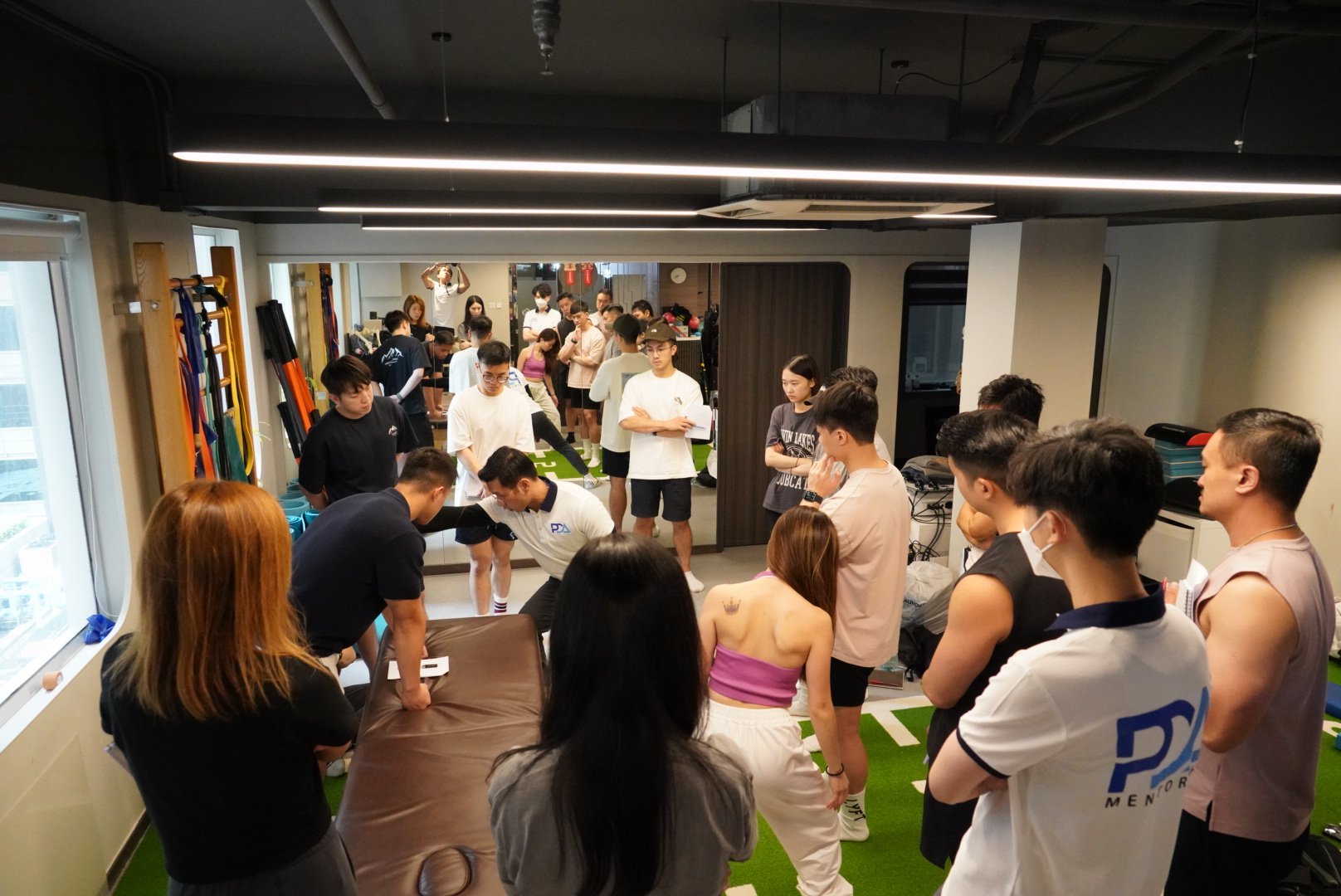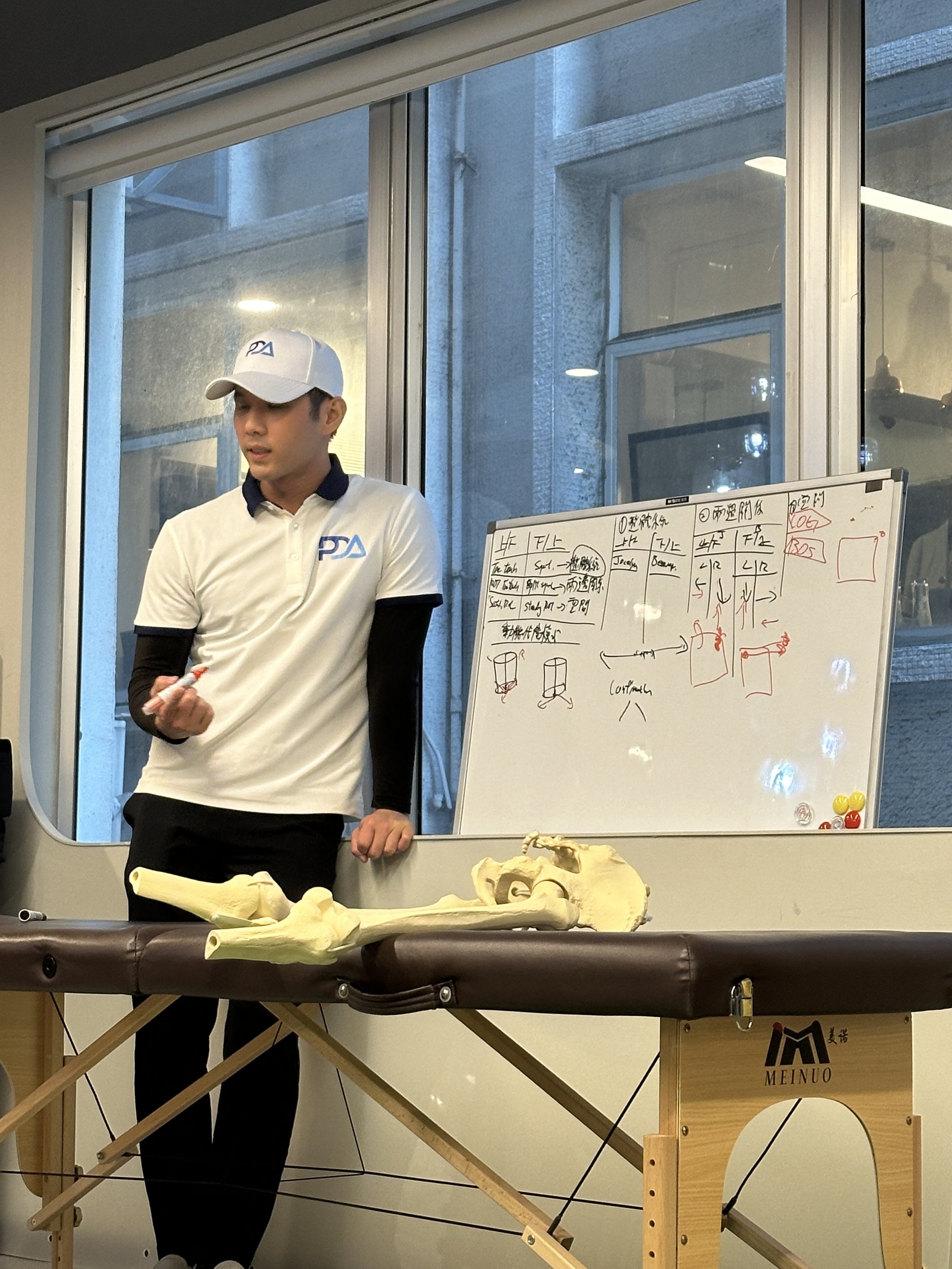
You don't need a P.H.D to think differently.
It doesn't matter how much you know or how much you don't know, you are here for an experience of learning, do not stress yourself out with high expectations like “I must take away a bunch of solutions and fix my clients immediately, otherwise I'm wasting time and money”
I can’t control how much you would benefit from this experience, but I'm sure you would get the most out of it if you “just experience”
What is PDA
PDA is a learning experience
I know you aren’t satisfied with this kind of blurry explanation and might think PDA sounds boring, what about this?
The Principle Driven Approach is a physics & bio-mechanical model to enhance human health & performance, respecting respiration, the nervous system, motor development internal dynamics, muscle physiology, connective tissue behavior, Fluid & joint mechanics, and human structures to enhance health and performance.
Better now, PDA now sounds pretty cool.
After PDA 1-3, you will have a context-driven understanding of what PDA is, and how it's helpful to you.
I do not have a fixed definition for you, sorry. PDA for me is a language, mindset, mental model, attitude, and happiness. I want all of you to have a principle-driven mindset when it comes to LEARNING.
Why PDA
Learn problem-solving, and ask better questions.
We are teaching you how to solve a problem & ask better questions, when we are stuck with a case or when you have no direction on where to go next, start asking questions, and answer them yourself, the process of looking for an answer will be your “true experiences” I can say for sure that it's not the same as “I’ve been working for 10 + years” with and without the problem-solving skill and the ability to keep asking question.
How PDA works
We present the fundamental principles, show you how movement occurs, take you through the testing protocol, give you a useful protocol for you to apply to start, and offer you an opportunity to think creatively to create a system/protocol/model/Approach that belongs to yourself, we will talk in details in “PDA structures of learning” section.
Your brain doesn't work well under “negative stress”
The biggest, the most important concept in PDA is always learning with Happiness and freedom. Your brain won't function the best in nervousness, awkwardness, and sadness.
However, you might experience frustrations, confusion, and unconfident moments, BUT. In a supportive environment that allows YOU to experience all kinds of emotions in this process, that’s why a PDA is a community but not a school or academy, no one is here to compete or prove yourself better, just learning together.
Long Wong Less Wrong, The beauty of making mistakes
Long Wong Less Wrong is the very first jargon that I post on social media, it does remind me something important.
When it comes to making mistakes, regrets, anger, frustrations. I am one of the most suitable people to talk to. I couldn't focus like other kids in my class when I was a kid, definitely not good at sports, didn't commutations, and definitely didn't have many friends, wanna be a superhero with superpower maybe a singer, I couldn’t find my strength, but. A bunch of weaknesses. I failed many times, til I learned my lessons, but huge amount of confusion and frustrations consumed me.
Making mistakes was my biggest fear, now I still fear making mistakes, but it's very minimal, not as crazy as my early years, because I noticed an interesting trend.
I make horrible mistakes at first, then I start making fewer horrible mistakes, then I start making fewer horrible mistakes, then I start making horrible mistakes...
Yes, I start making fewer horrible mistakes over the years. I started to accept there was no way I make any mistakes, only less horrible mistakes, you want to be less wrong, not be more successful.
The service that I was delivering to my clients was no longer just physical training anymore since then.
Learn Principles not Theory.
The definition of principles is “What is fundamentally true without context” It is a natural phenomenon.
“Theory exists for a reason, to be proven wrong”
theory is an explanation of a natural phenomenon
A theory is an idea that comes from principles and experiments, a theory is not “The truth”, it's wrong, but it could be useful.
To be driven by principles encourages you to generate your ideas, and conclusions, express creativity, run safe-to-fail experiments, be responsible with decisions, know how you fail, and how to be useful.
Examples of learning theories could be psychology and kinesiology etc...
I hope I can present the Principles behind all these ideas to you, so that “you can become your scientist”, we can talk about in the section below
it could be a whole different learning experience that you don't get traditionally, you will be creating a theory that's suitable for your current application level.
Applications or Principles First?
Chicken or eggs first? Should you understand concepts first before you apply? Or should you just do a bunch then you learn from your mistakes?
DO BOTH, but let me explain to you.
Principles are right, they can't be wrong, it will only be wrong when we start applying these principles to different situations because all situations are different, you won't run into the same situations twice ever, The way that the universe and human body work won't change, living organisms especially human are a complex system but not a machine. You will never know for sure about how a human responds.
That means you learn stuff by doing stuff, principles give you a framework to make useful mistakes when it comes to applications not just blindly doing stuff without references.
You are a scientist
What is science? Let me share my understanding.
How did Newton discover gravity? He sees a phenomenon, an apple dropping from a tree, then he comes up with an explanation to try to create an understanding of what's happening. He runs experiments enough times to prove his idea right.
Science comes from observations and safe-to-fail experiments.
Scientists run experiments and keep making mistakes until they receive a favorable and desirable outcome.
Bring this back to coaching/treatment.
1) You see a hip that's moving away from midline during a squat, you suspect that is associated with R's lower back pain the client is complaining about during a squat.
2) You have a rationale in your mind
3) Run the experiment to see if your rationale is accurate enough or not (perform an intervention)
4) If it works, keep doing it.
5) If it doesn't work, that means you've made a decision that is too far away from the truth, it doesn't generate a positive outcome, go back to the principles that can't be wrong without context, review your rationale, and run another experiment.
6) fail an experiment would slowly bring you towards a positive intervention, it's about repetitions once you have the right way to think and do stuff.
That means for those of you who got stuck is because you have not met the principles approach yet (Don't block me, just joking)
If you are driven by principles, at least you will know what's wrong and what direction to go towards, what to avoid, and what to do more.
You can’t customize a program/treatment plan before you can customize your mind.
I think this is quite straightforward forward and you know exactly what I meant, no need for further explanation, if you can’t be the unique you of thinking, how is it possible you know how to customize a program/treatment plan for someone else that you’ve just met?
We all know development takes time, that's why we provide a sequences protocol for you to reference so that you know where to start, make mistakes within a controllable range, and accumulate experience.
If you don't know what are you doing, you haven't made enough mistakes yet.
Follow before you lead, still follow while you lead
PDA is all about empowerment
If you are interested in bringing your talent and passion to our team, becoming one of us to assist our teaching, coaching, and refining our courses/information/presentation, please talk to us directly. We are more than happy to assist you in the best way that we can, always follow your strength & passion.
PDA structures of learning
PDA 1 - Change
A whole new perspective to look at health and performance, understand bio-mechanical principles, assessment, and first-level intervention that is helpful to your clients.
To learn something new, you must forget.
To accept new information, you must empty your cup and leave bias behind.
PDA 2 - Combine
Organize information into applications, take the principles and the testing protocol combine them with more solutions, from rehab to training. It's about coaching, and executing solutions at this stage.
PDA 3 - Create
Create a principle-driven approach that uniquely belongs to you, programming principles for a different context, before you try to design or customize a unique program for your client, you must create a unique way of thinking that works the best for you, it's all about creating in this stage.
PDA Community - Help each other
PDA offers a weekly update platform for education videos and monthly regular study groups.
People who speak similar languages with different backgrounds continue to grow, dive deeper network, ask/answer questions, and help each other out.
PDA Team training - Be useful
Team training is about being a POSITIVE influence on people who are interested in learning more, team training is for those who are interested in becoming a teaching assistant and teacher in the future in PDA.










